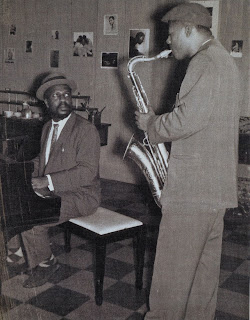 |
| I loved this place. |
I’m loathe to say it for fear of sounding crotchety, but
people today have it good, not like when I was younger. Yikes. That’s sounds
like an old man talking…but it’s true when it comes to jazz.
I’ve written before about my early days of discovering jazz
thanks to my local public library and I continued to make full use of library
jazz collections in various cities that I’ve lived. I spent days at the University
of Ottawa importing the entire Bill Evans Complete Riverside Recordings. Sure,
technically it was copyright infringement, but I didn’t have the cash for
expensive sets like that. Not having the money to pay is hardly a justifiable
excuse for theft, but let’s table the whole music piracy issue for another day.
The point I’m trying to make is that music was damned
expensive, especially in a genre like jazz. When I was a student in Toronto there
was still three or four jazz clubs that I frequented, of which only one (The
Rex) remains. I favoured vodka on the rocks back then and spent a fair bit of time and money drinking and loving the live music.
I also LOVED the used CD shops where I would routinely drop $40-$50
a month. I couldn’t really afford it, but for jazz I was willing to live
on rice pudding and grapefruit.
 |
| strange and cool and a bargain |
You couldn't find everything used, so I spent hours pouring through the fantastic jazz collection
at the now defunct Sam the Record Man on Yonge Street. The jazz section was up
on the second floor. It was possible to get deals now and then.
I remember that sweet day I found Carla Bley's two-CD set 'Escalator Over the Hill' for $20. That gold box shone light some holy relic and I listened to that strange, interesting, avante-garde music and thought what an odd and wonderful world we live in that there were people out there in this world making music like this.
Verve put out Verve
Jazz Masters recordings that cost less than $10 new and they helped me in my
musical education. Blue Note, Verve and others had 4 CD best-of-the-label sets
that were less than $30. Other than that, it was $20+ for a CD. They had so
many CDs that I wanted and couldn’t afford that going there was a bit
torturous.
I wonder how many times I stood there holding Yusef Lateef's
Detroit: Latitude 42° 30′ Longitude 83°? I loved the song
Russell and Elliot and wanted to hear the rest of the session. It cost $26 for 30 minutes of music. I couldn't justify it. I kept hoping it would turn up at one of the used CD stores I frequented (and I traveled from one end of the GTA to the other in search of Jazz).
 |
| too $$$ for me |
Now though…sign up for Spotify or Apple Music and suddenly
you get the entire store at your finger tips for a few bucks a month. I know I
love it and can finally listen to Coltrane’s “Heavyweight Champion” set without
dropping $100+ for it. You can listen to Russell and Elliot without having to decide if it was worth going without fruit and vegetables for the month.
There's a downside to this though. Man…I cherished those CDs I
could barely afford. I was literally choosing them over complete nutrition so I damned
well better enjoy them. Let the jazz drown out the hunger grooooooaaning from my
belly.
Do we appreciate things if they come without a bit of
struggle? I’m sure any psychiatrists in the room could expound on this theory.
I suspect they’d echo that old cliché that nothing worth having comes without a
price. Like many jazz musicians, I went hungry for the music.
I hope the new generation of jazz fans (whatever age they
might be) will take full advantage of the musical splendor available to them.
I hope Beginning With Mingus offers some advice on where to
start or continue your jazz journey. It never ends. I'm still growing and learning more about this greatest form of music. I know this site helped you, Harry, and I appreciated the note and
bottle of Scotch saying thanks for the education. Thanks for taking this walk with me.























